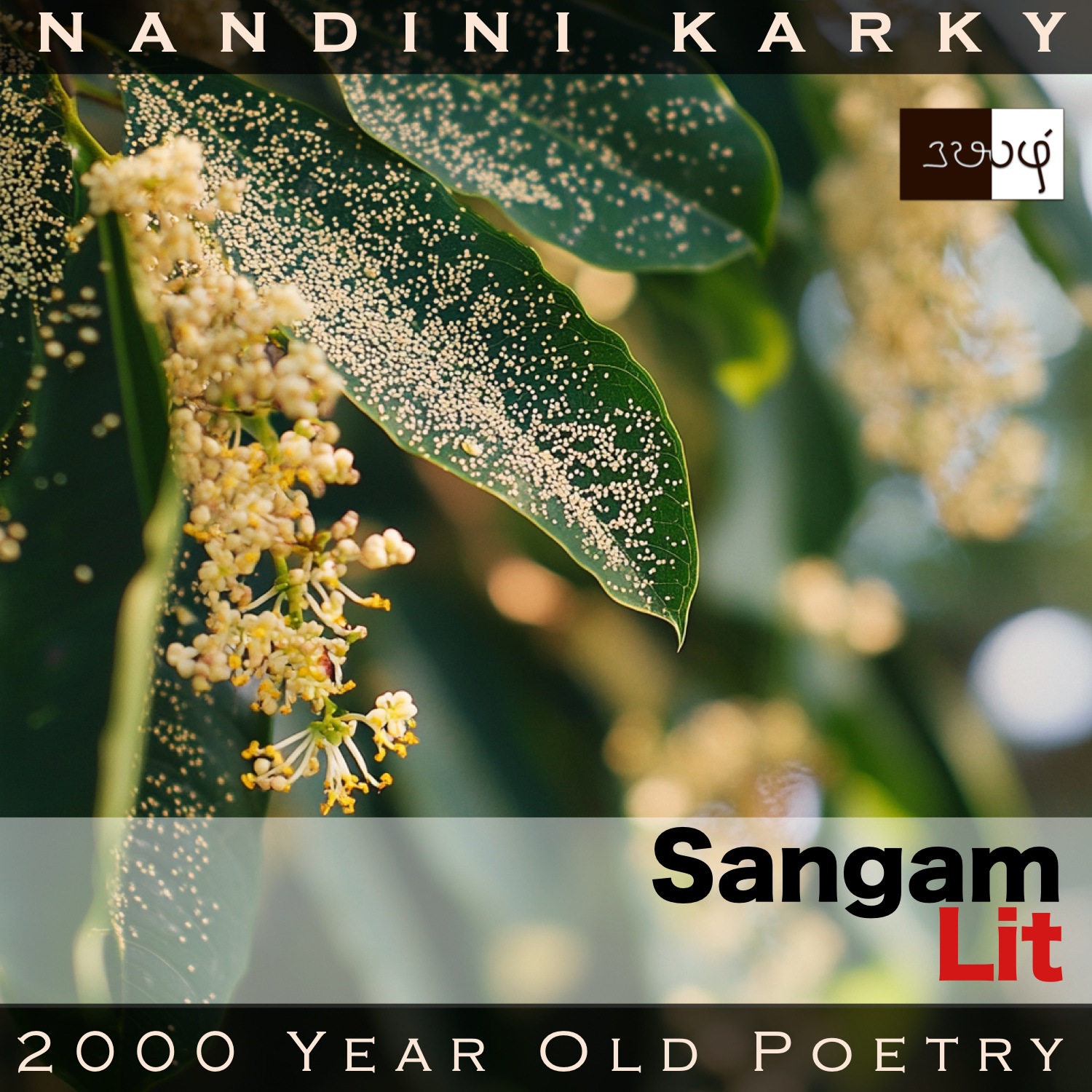Podcast: Play in new window | Download
Subscribe: Apple Podcasts | Spotify | Amazon Music | Android | iHeartRadio | TuneIn | RSS | More
In this episode, we perceive a message of good tidings, as portrayed in Sangam Literary work, Kalithogai 29, penned by the Chera King Paalai Paadiya Perunkadunko. The verse is situated in the ‘Paalai’ or ‘Drylands landscape’ and talks about the many elements that bring anxiety to the lady in the man’s absence.

‘தொல் எழில் வரைத்து அன்றி வயவு நோய் நலிதலின்,
அல்லாந்தார் அலவுற ஈன்றவள் கிடக்கை போல்,
பல் பயம் உதவிய பசுமை தீர் அகல் ஞாலம்
புல்லிய புனிறு ஒரீஇப் புது நலம் ஏர்தர;
வளையவர் வண்டல் போல், வார் மணல் வடுக் கொள;
இளையவர் ஐம்பால் போல், எக்கர் போழ்ந்து அறல் வார;
மா ஈன்ற தளிர்மிசை, மாயவள் திதலை போல்,
ஆய் இதழ்ப் பல் மலர் ஐய கொங்கு உறைத்தர;
மே தக இளவேனில் இறுத்தந்த பொழுதின்கண்
சேயார்கண் சென்ற என் நெஞ்சினை சின்மொழி!
நீ கூறும் வரைத்து அன்றி, நிறுப்பென்மன்! நிறை நீவி,
வாய் விரிபு பனி ஏற்ற விரவுப் பல் மலர் தீண்டி,
நோய் சேர்ந்த வைகலான், வாடை வந்து அலைத்தரூஉம்
போழ்து உள்ளார் துறந்தார்கண் புரி வாடும் கொள்கையைச்
சூழ்பு ஆங்கே சுடரிழாய்! கரப்பென்மன்! கைநீவி
வீழ் கதிர் விடுத்த பூ விருந்து உண்ணும் இருந் தும்பி
யாழ் கொண்ட இமிழ் இசை இயல் மாலை அலைத்தரூஉம்
தொடி நிலை நெகிழ்த்தார்கண் தோயும் என் ஆர் உயிர்
வடு நீங்கு கிளவியாய்! வலிப்பென்மன்! வலிப்பவும்,
நெடு நிலா, திறந்து உண்ண, நிரை இதழ் வாய் விட்ட
கடி மலர் கமழ் நாற்றம், கங்குல் வந்து, அலைத்தரூஉம்’
என ஆங்கு,
வருந்தினை வதிந்த நின் வளை நீங்க, சேய் நாட்டுப்
பிரிந்து செய் பொருட் பிணி பின் நோக்காது ஏகி, நம்
அருந் துயர் களைஞர் வந்தனர்
திருந்து எயிறு இலங்கு நின் தேமொழி படர்ந்தே.
The confidante changes the mood of the verse with her concluding statement. The words can be translated as follows:
“As the sickness in pregnancy tormented, losing her old beauty, making the family much worried, appeared a woman. Akin to her state after she has given birth, when the distressing labour is done, the wide lands with fields that have prospered plentifully but which had lost their fertility, have regained their health and beauty; Akin to the sand houses of young girls, the river sands have filled up with fallen flowers; Akin to the five-part braid of young maiden, the sands have split in waves along the shore; Akin to the pallor spots of a dark-skinned maiden, the pollen of many beautiful flowers have spread atop the new shoots of the mango tree; Such are the changes enacted by the season of spring that has arrived at this time;
O maiden who speaks sparse words! The heart of mine, which laments about the man who lives far apart, I can bring that under perfect control, even more than the bounds you ask for! But even when I do, caressing the many scattered, bloomed and moist flowers in this evening time when affliction brims, the northern winds torment me so!
O maiden who wears radiant ornaments! The fading changes in my form owing to my heart dwelling around the man, who thinks not about me, I can hide! But even when I do, feeding on the flowers that have been touched by the falling rays of the sun in this evening, the black bees that resound with the sound of lutes torment me so!
O maiden who renders perfect words! The precious life of mine that seems to revolve around the one who has made my bangles slip away, I can subdue! But, even when I do, as the faraway moon glows and bees pierce open and the flowers spread out their wide petals at night, the fragrance of these fine flowers torment me so!
Saying all this, you worried and made your bangles slip away. The one who parted away to a strange country in search of wealth, without thinking about you, has now come to end your great sorrow, thinking about the honey-like words from your perfect, shining teeth!”
Let’s delve into the details. The verse is situated in the context of the man’s parting after marriage and speaks in the voice of the lady initially with the confidante’s concluding words. The lady presents various similes to talk about the advent of spring, such as how the fields have turned lush following their period of drought, much like how a pregnant woman regains her lost health, after the birth of her child; river sands being decked with flowers and pollen like the sand houses of girls; wavy sands on the shore shining like a maiden’s five-part braid, and pollen of many different flowers falling on the green leaves of a mango tree, like the pallor-spotted complexion of a dark-skinned woman. So, it’s again the theme of ‘Spring’s here. But he’s not’.
As if replying to prior words of the confidante asking her to be strong, the lady says she can try to control her heart, hide the changes in her form and even subdue the quivering of her life, all affected by the man who had parted away. But even when she does so, the northern winds, the buzzing black bees and the fragrance of flowers that soar in the evening attack her and make her lose her resolve. Quoting these words of the lady, the confidante says, ‘you were so worried but now, the man arrives to end your sorrow’, thinking only about the sweet words the lady speaks. This statement is probably said with a laugh for the lady’s words lamenting about the man are hardly sweet! But the highlight of the verse is the message of hope for a worrying heart!




Share your thoughts...